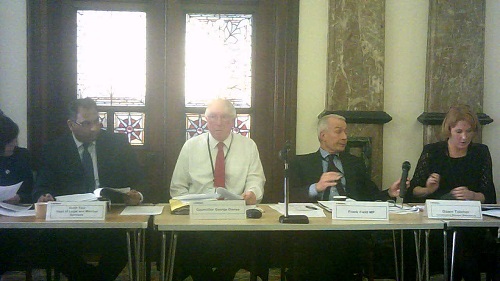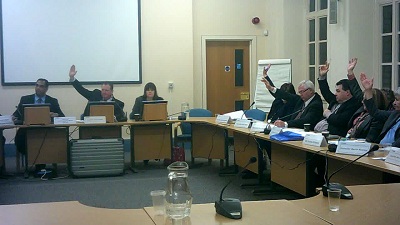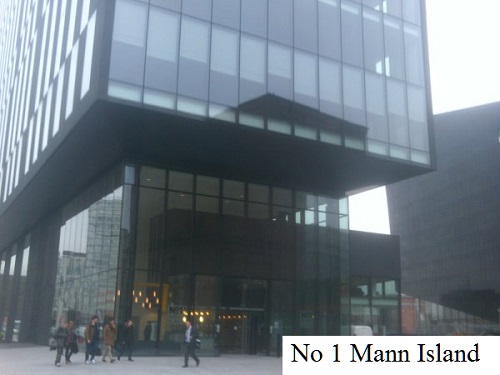Surjit Tour tells Wirral Council’s councillors that they have to accept filming at their public meetings

Birkenhead Constituency Committee (10th April 2014) Birkenhead Town Hall
Left to Right Surjit Tour (Head of Legal and Member Services), Councillor George Davies, Rt Hon Frank Field MP (Chair), Dawn Tolcher (Birkenhead Constituency Manager)
In an update to the blog post headlined Does Pickles think that Wirral Council’s £22,500 newspaper plan “pours taxpayers’ money down the drain”?, something seems to have happened “behind the scenes” as Surjit Tour had this to say to councillors on the subject at last night’s Transformation and Resources Policy and Performance Committee on an item about the Local Audit and Accountability Act 2014 (the bit he says about Wirral Council’s compliance with the Code of Recommended Practice on Local Authority Publicity is the relevant part):
“Thank you Chair, just very briefly taking you through this particular report. It’s a report that’s already been considered by the Audit and Risk Management Committee on the 14th March and the report seeks to summarise the key provisions of the Local Audit and Accountability Act 2014.
On the 13th August of 2010 the government announced its intention if you recall to abolish the Audit Commission and replace it with a decentralised process and arrangements with regard to the audit of public bodies. This Act seeks to set out the necessary framework in relation to the audit arrangements and I’ll turn your attention if I may to page fifty-seven of the report and that provides an explanatory note in terms of the key features of the current and new arrangements that are being introduced.
Paragraph 2.1 sets out and highlights features of the new arrangements and notably the abolition of the Audit Commission and with a view to arrangements being put in place. Under the new arrangements public bodies will be required to appoint an external, independent auditor on the advice of an independent audit panel. The audit panel which the Council must have in place and each local authority is required to have that audit panel in place to discharge their responsibilities, the appointment of an auditor. Various other… may be deferred on that particular panel by the Secretary of State.
The make up of that particular panel it talks about in the report of the recommended changes in the explanatory forward. The actual amend to the legislative framework with regards to council tax referendums and the revised measures to ensure local authorities’ compliance with the Code of Recommended Practice on Local Authority Publicity.
The Act also then introduces greater transparency and openness to meetings of Council meetings in particular by allowing local residents to film, tweet, blog and access the information in relation to decision-making in those committees. So it goes further than just the filming and the arrangements that we currently have.
We also then have arrangements and changes with regards to any local audit, taking account value for money elements which needs to be also factored in and we have a transfer of responsibilities of setting a new code of audit practice going now to the National Audit Office as part of these arrangements. So you see that in a bit more detail in paragraph three some of those provisions there in more detail.
In terms of our current arrangements, there are outsourcing arrangements in place and as you know we have Grant Thornton who is the external auditor for Council and that arrangement continues until 2017 at which point arrangements will be put in place for the appointment of a new local auditor and this is where the new local auditor panel will be engaged in the procurement of that particular body.
There will be a series of approved, accredited firms that will be able to do that and they will be made subject to assessment and criteria by the Financial Reporting Council and relevant professional accountancy bodies who are regulated in the provision of local government services.
In terms of the panel itself, details of its make up are set out in paragraph six of the explanatory note and this is where we need to have a panel which would consist of a majority of independent members and it would be chaired by an independent member. Now our Audit and Risk Management Committee can act as the Council’s auditor panel under the act if so required and if we need to appoint individuals then there’ll be a process that’ll need to be gone through.
You’ll recall that the Audit and Risk Management Committee, in fact it happened last year, indicated that it wished to be a majority of members of the Audit and Risk Management Committee to be independent and there will, arrangements are in hand to make those necessary arrangements. However the Secretary of State is still yet to publish regulations in relation to this particular Act, particularly the criteria and it needs to be expanded on what appears in the Act itself. So the draft regulations are not complete in terms of what the criteria will be for the appointment of independent members and as such a decision has been taken to await the Act or indeed those final regulations to ensure that any appointment that is made is compliant with those regulations.”
The Chair said, “Thanks Surjit, any questions, comments? Pat?”
Cllr Patricia Glasman said, “Paragraph 2.1.5 access information relating to the decisions made in those meetings, I wonder if you could just expand a little bit on that specifically the Pensions Committee we have attachments which are not available to the public. It’s business meetings and I just wondered was there any change to really the way those are treated?”
Surjit Tour replied, “No, there’s no, those changes with regards to information at committees considering the exempt schedules, the schedules before them so those provisions remain unchanged. This is very much the ability to report in open session at committee meetings, individuals being able to not only film, but to tweet, blog information in real-time and as decisions are made.”
The Chair said, “If there’s no further questions, can we agree the recommendations on page fifty-five, 11.1 agreed?”
The Committee agreed the following recommendation:
That the Committee notes the Report and Appendix 1 concerning the changes being introduced by the Audit and Accountability Act 2014 and its implications.
If you click on any of the buttons below, you’ll be doing me a favour by sharing this article with other people.

